The 18th Century 18世纪英国文学史
十八世纪英国文学简介
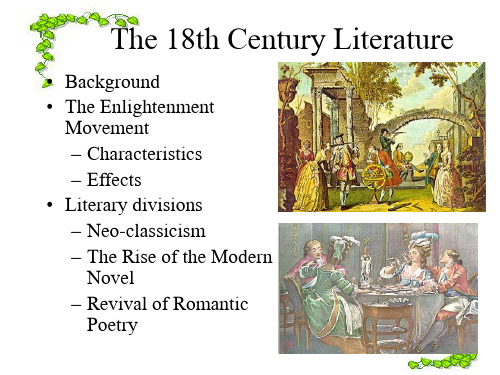
John Dryden (1631-1700)
• Heroic play: The Conquest of Grenada • Blank verse tragedy: All for Love • Prose: An Essay of Dramatic Poesy • Poetry:
Absalom and Achitophel The Medal A Song for St. Cecilis’s Day Alexander’s Feast
Neo-classicism
• It refers to the literary principle according to which the writing and criticism of poetry and drama were to be guided by rules and precedents derived from the best ancient Greek and Roman writers. Often employed in contrast with Romanticism, this term has also been used to describe the characteristic world-view or value-system of this “Age of Reason”, denoting a preference for rationality, clarity, restraint, order and decorum, for general truth rather than particular insights.The neo-classical view of literature included the principle of decorum by which the style must suit the subject matter, and the believe that art must both delight and instruct.The central assumption was that the ancient authors had already attained perfection, so that the modern author’s chief task was just to imitate them.
18世纪英国文学史
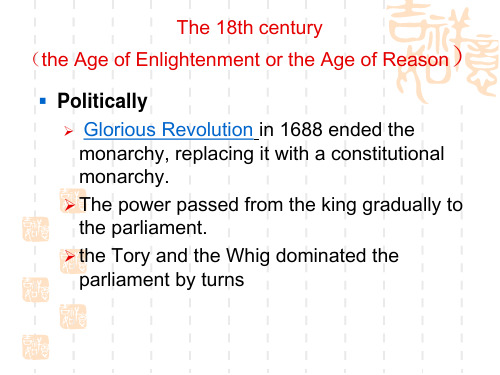
The 18th century (the Age of Enlightenment or the Age of Reason)
Politically Glorious Revolution in 1688 ended the monarchy, replacing it with a constitutional monarchy. The power passed from the king gradually to the parliament. the Tory and the Whig dominated the parliament by turns
Socially: the rapid growth of middle class
The Puritan spirit of wisdom, diligence,
honesty, and thriftiness, self-discipline
better education was available more schools and social clubs were
established
Economically
Industrial Revolution, the 1st powerful
industrial country
continued to expand its colonies
Ideologically: Under the influence of scientific discoveries ( Galileo,Newton) and flourishing of philosophies, French enlightenment started.
英国文学简史
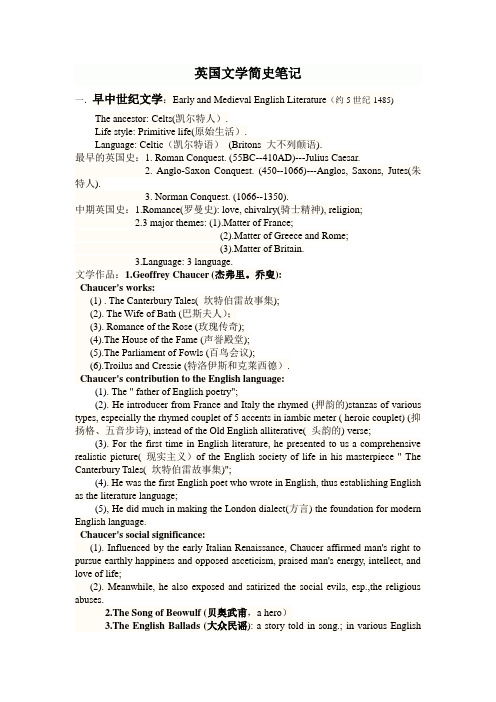
英国文学简史笔记一.早中世纪文学:Early and Medieval English Literature(约5世纪-1485) The ancestor: Celts(凯尔特人).Life style: Primitive life(原始生活).Language: Celtic(凯尔特语)(Britons 大不列颠语).最早的英国史:1. Roman Conquest. (55BC--410AD)---Julius Caesar.2. Anglo-Saxon Conquest. (450--1066)---Anglos, Saxons, Jutes(朱特人).3. Norman Conquest. (1066--1350).中期英国史:1.Romance(罗曼史): love, chivalry(骑士精神), religion;2.3 major themes: (1).Matter of France;(2).Matter of Greece and Rome;(3).Matter of Britain.nguage: 3 language.文学作品:1.Geoffrey Chaucer (杰弗里。
乔叟):Chaucer's works:(1) . The Canterbury Tales( 坎特伯雷故事集);(2). The Wife of Bath (巴斯夫人);(3). Romance of the Rose (玫瑰传奇);(4).The House of the Fame (声誉殿堂);(5).The Parliament of Fowls (百鸟会议);(6).Troilus and Cressie (特洛伊斯和克莱西德).Chaucer's contribution to the English language:(1). The " father of English poetry";(2). He introducer from France and Italy the rhymed (押韵的)stanzas of various types, especially the rhymed couplet of 5 accents in iambic meter ( heroic couplet) (抑扬格、五音步诗), instead of the Old English alliterative( 头韵的) verse;(3). For the first time in English literature, he presented to us a comprehensive realistic picture( 现实主义)of the English society of life in his masterpiece " The Canterbury Tales( 坎特伯雷故事集)";(4). He was the first English poet who wrote in English, thus establishing English as the literature language;(5), He did much in making the London dialect(方言) the foundation for modern English language.Chaucer's social significance:(1). Influenced by the early Italian Renaissance, Chaucer affirmed man's right to pursue earthly happiness and opposed asceticism, praised man's energy, intellect, and love of life;(2). Meanwhile, he also exposed and satirized the social evils, esp.,the religious abuses.2.The Song of Beowulf (贝奥武甫,a hero)3.The English Ballads (大众民谣): a story told in song.; in various Englishand Scottish dialects.---- Robin Hood (罗宾汉), who is strong, brave, clever, tender-hearted and affectionate(深情的).二、文艺复兴时期文学: The English Renaissance(15世纪后期-17世纪初)文艺复兴时期形成的思想体系被称为人文主义.几个过渡时期:1. The Hundred Year's War: 1337--1453;2. The wars of the Rose(玫瑰战争/蔷薇战争): 源于两个皇族所选的家微。
英国文学史 十八世纪 古典主义,感伤主义

A. Social background
5. With the advent of the 18th century, there sprang into life a public movement known as the enlightenment.
Abroad
A vast expansion of British colonies in
ended in a compromise between the
aristocracy and bourgeoisie. England became
a constitutional monarchy and power passed
from the King to the Parliament and the
• Puritanism is religious doctrine of the
revolutionary bourgeoisie during the
revolution. The puritans believed in thrift,
hard work and so on, and condemned worldly
A. Social background
3. The press became a mighty power, and any
writer with a talent for argument or satire was almost certain to be hired by party leaders. 4. The social life developed rapidly. in earlier ages: individualism in the 1st half of this century: sociability
The 18th Century Literature 英国文学史 新古典主义时期18世纪的英国文学
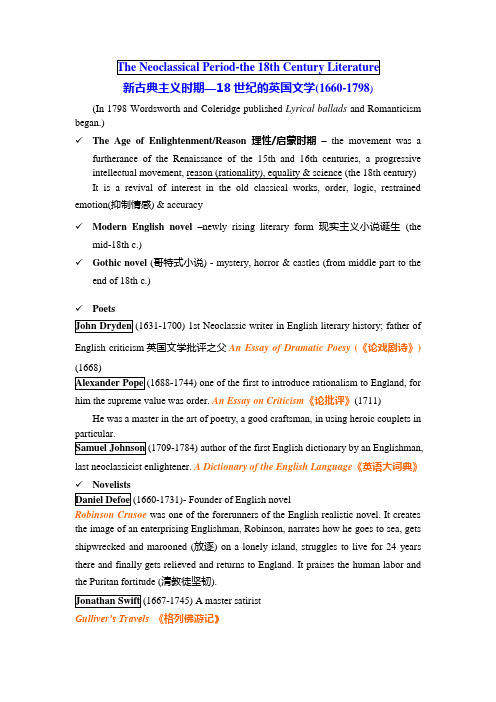
新古典主义时期—18世纪的英国文学(1660-1798)(In 1798 Wordsworth and Coleridge published Lyrical ballads and Romanticism began.)✓The Age of Enlightenment/Reason理性/启蒙时期–the movement was afurtherance of the Renaissance of the 15th and 16th centuries, a progressive intellectual movement, reason (rationality), equality & science (the 18th century) It is a revival of interest in the old classical works, order, logic, restrained emotion(抑制情感) & accuracy✓Modern English novel–newly rising literary form现实主义小说诞生(themid-18th c.)✓Gothic novel (哥特式小说) - mystery, horror & castles (from middle part to theend of 18th c.)✓PoetsEnglish criticism英国文学批评之父An Essay of Dramatic Poesy (《论戏剧诗》) (1668)him the supreme value was order. An Essay on Criticism《论批评》(1711)He was a master in the art of poetry, a good craftsman, in using heroic couplets in particular.last neoclassicist enlightener. A Dictionary of the English Language《英语大词典》✓NovelistsRobinson Crusoe was one of the forerunners of the English realistic novel. It creates the image of an enterprising Englishman, Robinson, narrates how he goes to sea, gets shipwrecked and marooned (放逐) on a lonely island, struggles to live for 24 years there and finally gets relieved and returns to England. It praises the human labor and the Puritan fortitude (清教徒坚韧).Gulliver’s Travels《格列佛游记》It offers people an opportunity for self-scrutiny. In his opinion, human nature is seriously and permanently flawed. The book is one of the most effective and devastating criticisms and satires of all aspects in the then English and European life.Lilliput(小人国),Brobdingnag(大人国), Flying Island(飞岛)& Houyhnhnm(智马国)(1707-1754)- Father of English novelH e was the first to write a “Comic epic in prose” (散文体的滑稽史诗), the firstto give the modern novel its structure and style. He adopted “the third-person narration”.He, a combination of novelist, playwright, and satirist, political pamphleteer, sees the novel as a vehicle for moral inculcation, a mirror and an imitation of nature and life.The History of Tom Jones, a Foundling《弃儿汤姆·琼斯》is a masterpiece on the subject of human nature, which brings the author the name of the “Prose Homer”✓Prose writersand write character sketches and use conversational styles, correspondences in essays. English familiar essay featured with humor, intimacy and elegance was shown first in The Tatler and The Spectator.SentimentalismDiscontented with reason, sentimentalists resort to emotion, to “the human heart”. Sentiment serves as a means of achieving happiness and social justice.(1700-1748) The Seasons in blank verse (1740)Night Thoughts in blank verseThe Task in blank verseTo Simplicity, The Passion, To Eveningleader of sentimental poetry, “The Graveyard School”(墓园诗人)Elegy Written in a Country Churchyard 《墓畔哀歌》reflects on death,the sorrows of life, and the mysteries of human life with a touch of his personal melancholy. He sympathized for the poor and the unknown, but mocks the great ones who despise the poor and bring havoc (破坏) on them.Pre-Romanticism雕刻家)Songs of Innocence《天真之歌》:a happy and innocent world from a child’s point of viewSongs of Experience《经验之歌》: a world of misery, poverty, disease, war and repression with a melancholy (忧郁的) tone from an adult’s point of view.(1759-1796)He is a master of the old Scottish tradition. He used Scottish dialect, English and a medley of the two to write poems. He is the poet of the people.A Red Red Rose expresses the noblest and sweetest human sentiment.Auld Lang Syne eulogizes friendship。
英国文学简史 4新古典主义(18世纪)
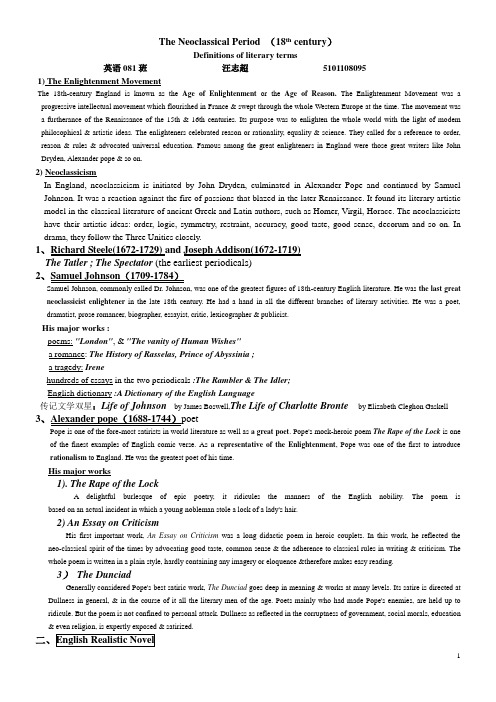
The Neoclassical Period (18th century)Definitions of literary terms英语081班汪志超51011080951) The Enlightenment MovementThe 18th-century England is known as the Age of Enlightenment or the Age of Reason.The Enlightenment Movement was a progressive intellectual movement which flourished in France & swept through the whole Western Europe at the time. The movement was a furtherance of the Renaissance of the 15th & 16th centuries. Its purpose was to enlighten the whole world with the light of modem philosophical & artistic ideas. The enlighteners celebrated reason or rationality, equality & science. They called for a reference to order, reason & rules & advocated universal education. Famous among the great enlighteners in England were those great writers like John Dryden, Alexander pope & so on.2) NeoclassicismIn England, neoclassicism is initiated by John Dryden, culminated in Alexander Pope and continued by Samuel Johnson. It was a reaction against the fire of passions that blazed in the later Renaissance. It found its literary artistic model in the classical literature of ancient Greek and Latin authors, such as Homer, Virgil, Horace. The neoclassicists have their artistic ideas: order, logic, symmetry, restraint, accuracy, good taste, good sense, decorum and so on. In drama, they follow the Three Unities closely.1Richard Steele(1672-1729) and Joseph Addison(1672-1719)The Tatler ; The Spectator (the earliest periodicals)2Samuel Johnson(1709-1784)Samuel Johnson, commonly called Dr. Johnson, was one of the greatest figures of 18th-century English literature. He was the last great neoclassicist enlightener in the late 18th century. He had a hand in all the different branches of literary activities. He was a poet, dramatist, prose romancer, biographer, essayist, critic, lexicographer & publicist.His major works :poems: "London", & "The vanity of Human Wishes"a romance: The History of Rasselas, Prince of Abyssinia ;a tragedy: Irenehundreds of essays in the two periodicals :The Rambler & The Idler;English dictionary :A Dictionary of the English Language传记文学双星:Life of Johnson by James Boswell,The Life of Charlotte Bronte by Elizabeth Cleghon Gaskell3Alexander pope(1688-1744)poetPope is one of the fore-most satirists in world literature as well as a great poet. Pope's mock-heroic poem The Rape of the Lock is one of the finest examples of English comic verse. As a representative of the Enlightenment, Pope was one of the first to introduce rationalism to England. He was the greatest poet of his time.His major works1). The Rape of the LockA delightful burlesque of epic poetry, it ridicules the manners of the English nobility. The poem isbased on an actual incident in which a young nobleman stole a lock of a lady's hair.2) An Essay on CriticismHis first important work, An Essay on Criticism was a long didactic poem in heroic couplets. In this work, he reflected the neo-classical spirit of the times by advocating good taste, common sense & the adherence to classical rules in writing & criticism. The whole poem is written in a plain style, hardly containing any imagery or eloquence &therefore makes easy reading.3)The DunciadGenerally considered Pope's best satiric work, The Dunciad goes deep in meaning & works at many levels. Its satire is directed at Dullness in general, & in the course of it all the literary men of the age. Poets mainly who had made Pope's enemies, are held up to ridicule. But the poem is not confined to personal attack. Dullness as reflected in the corruptness of government, social morals, education & even religion, is expertly exposed & satirized.The Realistic Novel:The mid-century was, however, predominated by a newly rising literary form, the modern English novel, which, contrary to the traditional romance of aristocrats, gives a realistic presentation of life of the common English people. This-the most significant phenomenon in the history of the development of English literature in the eighteenth century - is a natural product of the Industrial Revolution & a symbol of the growing importance & strength of the English of the growing importance & strength of the English middle class, Among the pioneers were Daniel Defoe ,Samuel Richardson, Henry Fielding, Laurence Sterne, Tobias George Smollett, & Oliver Goldsmith.1Daniel Defoe(1660-1731)He acquired a pure naked English—smooth, easy, almost colloquial. Yet never coarse. He loved short, crisp, plain sentences. There is nothing artificial in his language; it is really common English.作品:1)Pamphlet: The Trueborn Englishman—A Satire.(It contained a caustic exposure of the aristocracy and the tyranny of the church.)2)Novels:Robinson Crusoe(The character of Robinson Crusoe is representative of the English bourgeoisie atthe earlier stage of its development.); Captain Singleton; Moll Flanders; Colonel Jacque2Jonathan Swift (1667-1745)He is an Irish. Swift is one of the greatest masters of English prose. His language is simple, clear and vigorous. He said, “Proper words in proper places, makes the true definition of a style.” Swift is a master of satirist, and his irony is deadly. But his satire is masked by an outward gravity, and an apparent calmness conceals his bitter irony. This makes his satire all the more powerful, as shown in his Modest Proposal.作品:1)Two stories: A Tale of a Tub; The Battle of the Books(The two stories made him well-known as a satirist.)2) Novel:Gulliver’s Travels3) Pamphlets :The Drapier’s Letters; A Modest Proposal(Swift’s pamphlets in Ireland form avery important part of his works.)3Samuel Richardson(1689-1761)His main achievement as a novelist lies in his technique to show characters as personalities. Psychological analysis.作品:Pamela (The story is a told in a series of letters from the heroine, Pamela Andrews.书信体小说);Clarissa; Sir Charles Grandison.Pamela was a new thing in three ways:Firstly, it discarded the “improbable and marvellous”accomplishment of the former heroic romances, and pictured the life and love of ordinary people.Secondly, its intension was to afford not merely entertainment but also moral instruction. Thirdly, it described not only the sayings and doings of the characters but also their secret thoughts and feelings. It was, in fact, the first English psycho-analytical novel.4Henry Fielding(1707-1754)1)简介:As a novelist, Fielding is very great. He is the founder of the English realistic novel and sets up the theory of realism in literary.“Nature herself,” i.e., the exact observation and study of real life, was the basis of Fielding’s work. Byron, in a famous phrase, called Fielding “the prose Homer of Human Nature”. Fielding established once for all the form of the modern novel. His importance in the history of the novel is unique. He has been rightly call the “father of the English novel”.2)作品:Novels:①Joseph Andrews ②Jonathan Wild ③Tom Jones(流浪汉小说) ④AmeliaPicaresque Novel(流浪汉小说)is a popular sub-genre of prose fiction, which is usually satirical and depict in realistic and humorous details the adventures of a roguish hero of low social class, who lives by his or her wits in a corrupt society. The characteristic of it is loosely linked episodes, intrigue fights and adventures. The style of this novel originated in Spain and flourished in Europe in the 17th and 18th centuries, and continued to influence modern literature. In England, Tobias Smollett’s works, Daniel Defoe’s “Moll Flanders”, Fielding’s “Tom Jones”, and Charles Dickens’“Pickwick Papers” are considered to be picaresque novels. In modern America, Sawl Bellow’s “Adventure of Augie March”, Jack Kerouac’s “Dharma Bums” can be called picaresque novels. The Chinese “Journey to the Wrest” is considered to has considerable elements of picaresque.3)Some Features of Fielding’s Novels①Fielding’s method of Relating a Story: told directly by the author.②Satire in Fielding’s Novels. Satire sounds everywhere in Fielding’s works.③Fielding believed in the educational function of the novel.④Style. Fielding is a master of style. His style is easy, unlaboured and familiar, but extremely vivid and vigorous.5Tobias Smollett(1721-1771)He is a Scottish. He belonged to the realistic school.作品:Roderick Random, Peregrine Pickle, Humphry Clinker, History of England.6Laurence Sterne(1713-1768)He is a novelist of the sentimentalist school. He was born in Ireland.A Sentimental Journey.The drama of the 18th century was extensive, but very little of it has permanent or acting value. Only two men, Goldsmith and Sheridan, produced works which are of high literary quality and which are still remain their interest upon the stage.1Oliver Goldsmith(1730-1774)Goldsmith was a poet, novelist, dramatist and essayist, all combined in one person. He was born in Ireland.Comedies: The Good-Natured Man, She Stoops to Conquer2、Richard Brinsley Sheridan(1751-1816)was, like Goldsmith, an Irishman. His literary fame rests almost exclusively uponhis dramas. His dramas are sufficient to maintain his reputation as one of the most brilliant of English writers of Comedy.戏剧作品:①The Rivals, ②The School for Scandal(It gives a brilliant portrayal and a biting satire ofIn the first half of the 18 century, Pope was the leader of English poetry and the heroic couplet the fashion of poetry. But the middle of the century, however, sentimentalism gradually made its appearance.The appearance and development of sentimentalist poetry marks the midway in the transition from classicism to its opposite, Romanticism, in English poetry.Sentimentalism : It is a literary current started in the middle of 18th century. It is a part of the Pre-Romantic trend as reaction against the cold, logic rationalism that dominated people’s life and writing since the last decade of the 17th century. It appeared to sentiment as a means of achieving happiness and social justice. They believed that the effective emotions were the evidence of kindness and goodness. A ready sympathy and an inward pain for the misery of others became part of accepted social morality and ethics. Their words reveal a purely emotional approach to life on the part of the narrator. They formed the contrast of rationally composed novel. The most outstanding figure of this school was Laurence Stern who composed “Tristram Shandy”and “Sentimental Journey through France to Italy”. Samuel Richardson’s work also belong to this school because he used a lot of psychological analysis. Oliver Goldsmith’s work, especially “The Vicar of Wakefield”is of this time. Thomas Gray, a member of Graveyard school is a member of sentimental school, because Graveyard School is part of Sentimental School.1Laurence Sterne(1713-1768)He is a novelist of the sentimentalist school. He was born in Ireland.作品:Tristram Shandy, A Sentimental Journey.2Thomas Gray(1716-1771):作品:Elegy Written in a Country Churchyard. (This is a poem full of the gentle melancholy which marks all early romantic poetry.)Graveyard School: is a term applied to the 18th century poets who wrote melancholy, reflective works, often set in graveyard, on the theme of human morality. The dominant imageries are graveyard, death and darkness. They are part of Sentimental School in the 18th century literature. Thomas Gray’s “Elegy Written in a Country Churchyard” was the best known example for the time.Elegy: It is an ancient form of writing. Its tradition can be traced back to Greek. It is a kind of war song, the song that eulogizes the warring spirit, especially to celebrate the victory of the war and to lament upon the dead. Later, thiswriting is used for lamentation over one’s loss, one’s complaint, one’s unhappiness or things like that. In France, people sometimes use elegy for love lyric.3Oliver Goldsmith(1730-1774)Goldsmith was a poet, novelist, dramatist and essayist, all combined in one person. He was born in Ireland.作品:⑴Poems:①The Traveller is based on Goldsmith’s personal observation during his European wanderings. He came to the conclusion that human happiness depends less on political institution than onour own minds.②The Deserted Village is Goldsmith’s best poem. It contains some charmingdescriptions of village life. He marks the depopulation in the countryside owing to the inroads ofmonopolizing riches.⑵Novel: The Vicar of Wakefield. His novel appeals to human sentiment as a means of achieving happinessand social justice. That is why he is acknowledged to be one of the representatives of English sentimentalism.⑶Comedies: The Good-Natured Man, She Stoops to Conquer⑷Essays: The Citizen of the World.Goldsmith’s place as one of the greatest English essayists is mainlyIn the latter half of the 18century, a new literary monument arose in Europe, called the Romantic Revival. In England, this movement showed itself in the trend of Pre-Romanticism in poetry, which was ushered by Percy, Macpherson and Chatterton, and represented by Blake and Burns,the two greatest romantic poets of the 18th century.Pre-Romanticism:It rose as a reaction against enlightenment and neoclassicism, especially against reasons advocated by them. It originated by conservative groups men of letters and rose in the latter half of 18th century. The representatives are Thomas Gray, William Blake and Robert Burns.1William Blake(1757-1827)①The earliest of the major English Romantic poets.②Like Shelley, Blake strongly criticized the capitalists' cruel exploitation, saying that the "dark satanic mills left menunemployed, killed children & forced prostitution."③From childhood, Blake had a strongly visual mind; whatever he imagined, he also saw. As an imaginative poet, hepresents his view in visual images instead of abstract terms. " I know that This world is a world of IMAGINATION & Vision," & that "The Nature of my work is visionary or imaginative."④Blake writes his poems in plain & direct language.works:①The Songs of Innocence is a lovely volume of poems, presenting a happy & innocent world,though not without its evils & sufferings.②The Songs of Experience paints a different world, a world of misery, poverty, disease, war &repression with a melancholy tone.③Marriage of Heaven & Hell marks his entry into maturity.④The Book of Urizen, The Book of Los,The Four Zoas,Milton2、Robert Burns(1759-1796)He is the greatest of Scottish poets. He devoted all his free time to collecting, editing, restoring and imitating traditional Scottish songs, or writing verses of his own to traditional tunes.works:①Burns is remembered mainly for his songs written in the Scottish dialect on a variety of subjects.②Numerous are Burns’ songs of love and friendship. A Red, Red Rose③Bruce at Bannockburn is a typical song of patriotism.⑤The Tree of Liberty and A Revolutionary Lyric are the poems on the theme of revolution.⑥The Toadeater is a piece of bitter satire.⑦The Jolly Beggars is characterized by humour and lightheartedness.。
吴伟仁《英国文学史及选读》(重排版)-章节题库(第四~五章)【圣才出品】
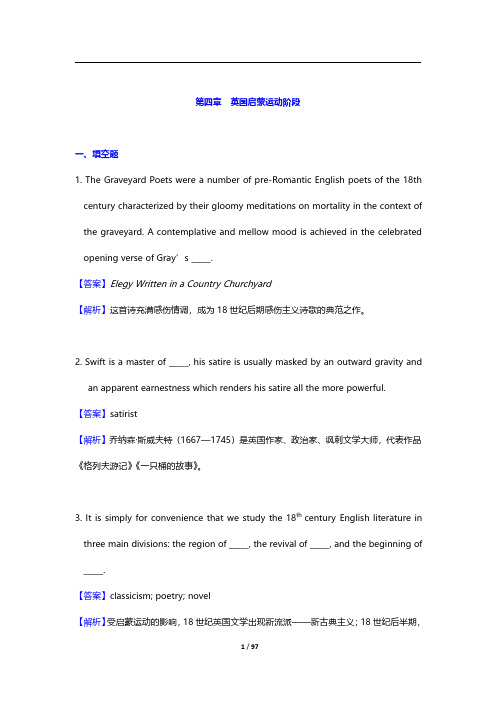
第四章英国启蒙运动阶段一、填空题1.The Graveyard Poets were a number of pre-Romantic English poets of the18th century characterized by their gloomy meditations on mortality in the context of the graveyard.A contemplative and mellow mood is achieved in the celebrated opening verse of Gray’s_____.【答案】Elegy Written in a Country Churchyard【解析】这首诗充满感伤情调,成为18世纪后期感伤主义诗歌的典范之作。
2.Swift is a master of_____,his satire is usually masked by an outward gravity andan apparent earnestness which renders his satire all the more powerful.【答案】satirist【解析】乔纳森·斯威夫特(1667—1745)是英国作家、政治家、讽刺文学大师,代表作品《格列夫游记》《一只桶的故事》。
3.It is simply for convenience that we study the18th century English literature in three main divisions:the region of_____,the revival of_____,and the beginning of _____.【答案】classicism;poetry;novel【解析】受启蒙运动的影响,18世纪英国文学出现新流派——新古典主义;18世纪后半期,前浪漫主义产生并逐渐取代新古典主义;小说产生于18世纪,并成为一个重要的文学体裁。
18th Century英国文学
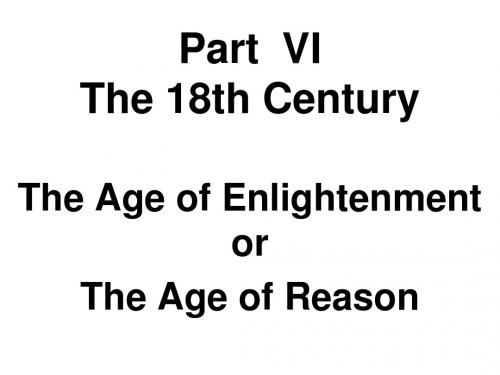
(4) Defoe, Richardson, Fielding, Sterne, Goldsmith & Smollet were among the major novelists of the time. By combining the allegorical tradition of the moral fables with the picaresque tradition of the lower-class stories, they achieved in their works both realism & moral teaching.
2. Neoclassicism
(1) The term mainly applies to the classical tendency which dominated the literature of the early period. It was, at least in part the result of a reaction against the fires of passion which have blazed in the late Renaissance, esp. in the metaphysical poetry.
(2) It found its artistic models in the classical literature of the ancient Greek & Roman writers like Homer, Virgil, Horace, Ovid, etc., and in the contemporary French writers such as Voltaire & Diderot.
- 1、下载文档前请自行甄别文档内容的完整性,平台不提供额外的编辑、内容补充、找答案等附加服务。
- 2、"仅部分预览"的文档,不可在线预览部分如存在完整性等问题,可反馈申请退款(可完整预览的文档不适用该条件!)。
- 3、如文档侵犯您的权益,请联系客服反馈,我们会尽快为您处理(人工客服工作时间:9:00-18:30)。
CHAPTER 8 THE AGE OF CLASSICISM
2.
Classicism: a term when applied generally, means clearness, elegance, symmetry, and repose produced by attention to traditional forms. More precisely, the term refers to the admiration and imitation of Greek and Roman literature, art, and architecture. It stands for certain definite ideas and attitudes including dominance of reason, balance and order etc. Classicism is usually contrasted with romanticism.
CHAPTER 8 THE 18TH CENTURY AND CLASSICISM
By Yao Benbiao
yaobenbiao@
CHAPTER 8 THE AGE OF CLASSICISM
I.
Great Events: 1. Glorious Revolution: In 1688, William of Orange and his wife Mary were invited to take the throne, a bloodless change of power 2. The constitutional monarchy was formally established after George I became the King of England, with more power left to the Parliament
CHAPTER 8 THE AGE OF CLASSICISM
Alexander Pope (1688 – 1744)
CHAPTER 8 THE AGE OF CLAStives 1. Alexander Pope (1688 – 1744) – the greatest poet in the first half of the 18th century 1) Life Career: -- a Roman catholic; -- weak and deformed, crooked after 12 -- received little education, self learned --began to translate classic works from Latin at 15 -- made acquaintances with well-known men of letters -- translated Homer and made good money, bought big house (the first successful professional writer)
CHAPTER 8 THE AGE OF CLASSICISM
--
made some enemies, attacking them in one way or another 2) Literary achievements -- An Essay on Criticism (1711): the first major poem, expressing his neoclassic ideas, in heroic couplets -- The Rape of the Lock (1712): his famous mock epic – to present the very trivial incident of a war between two families over a lock of hair
CHAPTER 8 THE AGE OF CLASSICISM
II.
Great thinkers: 1. 1678, Issac Newton (1642 -1727): law of gravitation – all objects in the universe are attracted to each other by a certain force which is in direct proportion to their mass and in inverse proportion to the square of the distance between the objects 2. John Locke (1632 – 1704): the father of a new theory of knowledge, holding that all of men’s knowledge originates from sense perception – foundation of reason
3.
CHAPTER 8 THE AGE OF CLASSICISM
III.
New Terms: 1. Enlightenment Movement: was a progressive intellectual movement throughout Western Europe in the 18th century. The Enlightenment celebrated reason (rationality), equality, science and human being’s ability to perfect themselves and their society. They believed in the power of reason, so the 18th century in England has been called “the Age of Reason”.
CHAPTER 8 THE AGE OF CLASSICISM
3.
Neoclassicism: in English literary history, refers to the literary trend in the first half of the 18th century. They modeled themselves on Greek and Latin authors, and tried to control literary creation by some fixed laws and rules drawn from Greek and Latin works. Chief representatives are Alexander Pope and Jonathan Swift.
CHAPTER 8 THE AGE OF CLASSICISM
1726, published his masterpiece, Gulliver’s Travel -- 1729, came out his A Modest Proposal. He suggested that the Irish problems of famine and overpopulation could be easily solved by having the babies of poor Irish subjects sold as delicacies to feed the rich. It is a heartbreaking piece of sarcasm and a most powerful blow to the English government’s policy of exploitation and oppression in Ireland.
CHAPTER 8 THE AGE OF CLASSICISM
2.
Jonathan Swift (1667 – 1745) – most outstanding prose writer and satirist
CHAPTER 8 THE AGE OF CLASSICISM
1)
Life career: -- born in Dublin, Ireland -- was a secretary to Sir William Temple -- 1709, worked as a minister of the Church of England in Ireland -- 1710, worked for the Tory journal of The Examiner -- formed the Scriblerus Club -- 1713, was the Dean of the St. Patrick Cathedral in Ireland
CHAPTER 8 THE AGE OF CLASSICISM
3.
The Industrial Revolution developed rapidly, which moved England to become the world’s number one capitalist and imperialist country 4. American Revolution broke out in 1775, which ended up in the defeat of the English troops and the independence of the American people 5. French Revolution began in 1789, which had a strong effect upon England.
CHAPTER 8 THE AGE OF CLASSICISM
